The tenth annual report highlights influential lifestyle topics and emerging cultural shifts for floral professionals
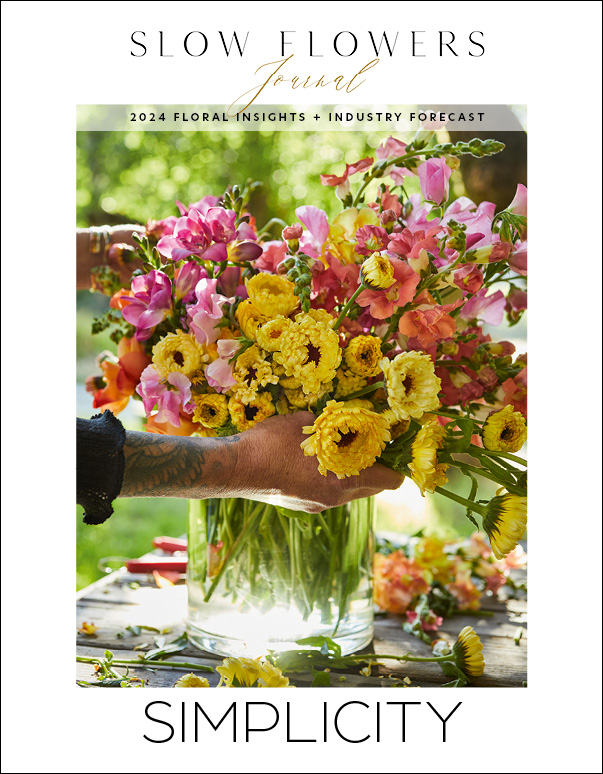
January 2, 2024 – Slow Flowers Society and its publishing partner BLOOM Imprint released their 2024 report on noteworthy lifestyle insights for flower farming and floral design professionals, identifying seven influential topics for the coming year. Titled “The Year of Simplicity,” the report cites an increasing desire among consumers to make conscious and sustainable decisions about how they spend money and time.
Report authors Debra Prinzing and Robin Avni are partners in BLOOM Imprint, the boutique publishing venture co-founded in 2021. Prinzing issued Slow Flowers’ first forecast in 2015 and continued producing yearly reports until she was joined by Avni in 2021, when the partners expanded the forecast to encompass a broader focus on horticulture, gardening, and consumer lifestyle themes.
Prinzing is inspired by wide-ranging conversations with florists, growers, influencers, makers, and educators, while Avni contributes her point of view and expertise in cultural and consumer behavior informed by her career in trend analysis.
By highlighting the concept of “Simplicity” for 2024, the authors take note of floral practitioners who are building purposeful, values-driven businesses, and who are communicating these ideas as brand differentials. “For floral professionals, this means making seasonality and sustainability more central to their enterprises,” Prinzing explains. “In the larger cultural context, we believe that people are ‘seeking less’ – as a response to excessive consumption, commercialism, and the smothering presence of technology, among other prevailing issues of the day.”
Avni continues: “Consumers want to return to their core values. This does not mean a lack of progress; but, whether for caution or conviction, people want to make smart and safe choices – for their lifestyles and for the environment. Simplicity is the antidote to what we otherwise can’t control.”
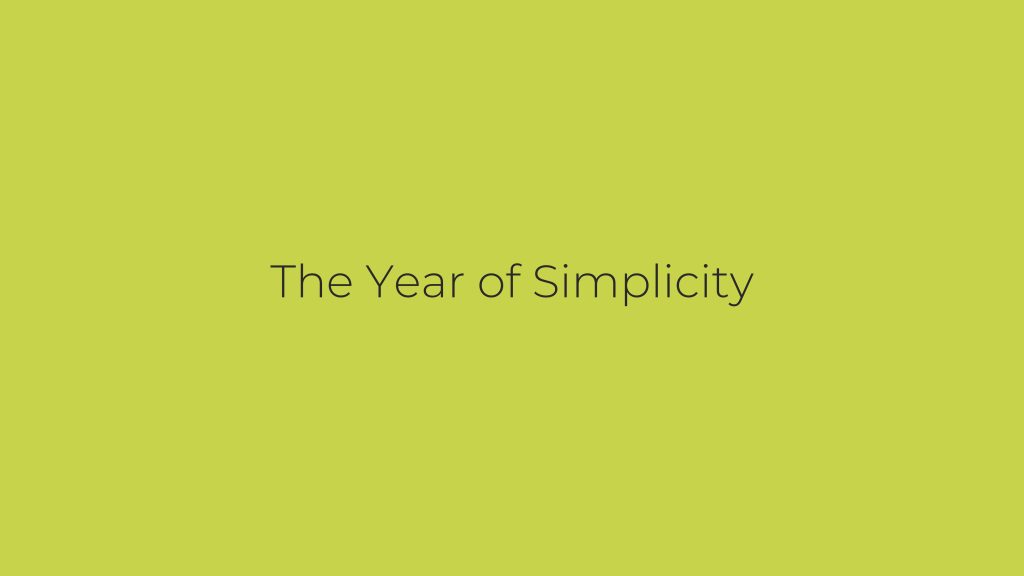
The seven insights cover a wide range of themes around art and design, agriculture and gardening, sustainability, and environmental choices that florists, flower farmers, and their customers are facing in the coming year. Each theme is supported by examples from the larger culture and interviews with members of the Slow Flowers community. Relevant data is included from the 2024 Slow Flowers Member Survey. The authors conclude each insight with analysis that asks “What Does it Mean for You?” The insights include:
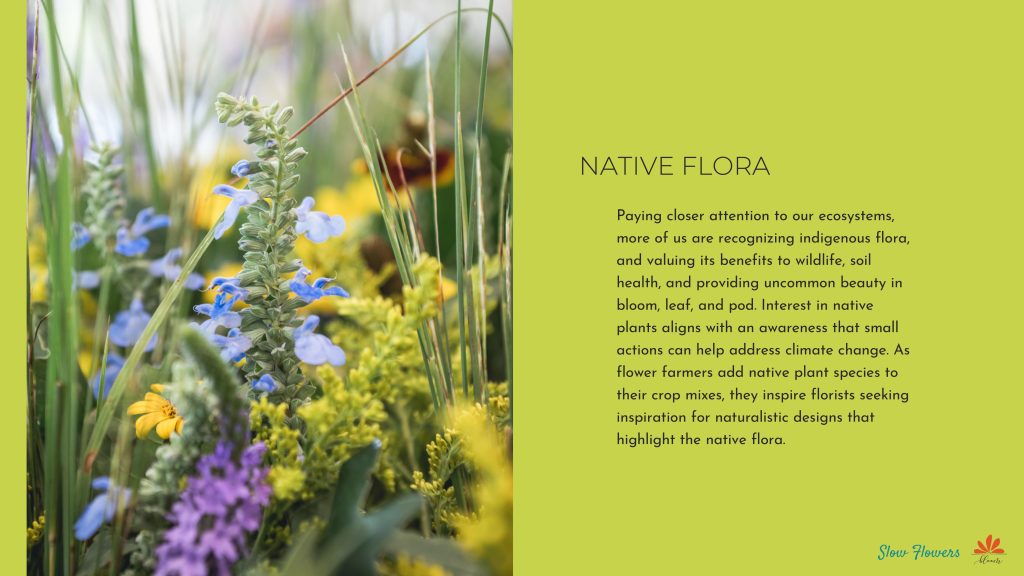
NATIVE FLORA: Paying closer attention to the ecosystem, more floral professionals are recognizing indigenous flora, and valuing its benefits to wildlife, soil health, and providing uncommon beauty in bloom, leaf, and pod. Interest in native plants aligns with an awareness that small actions can help address climate change. As flower farmers add native plant species to their crop mixes, they inspire florists seeking inspiration for naturalistic designs that highlight the native flora.
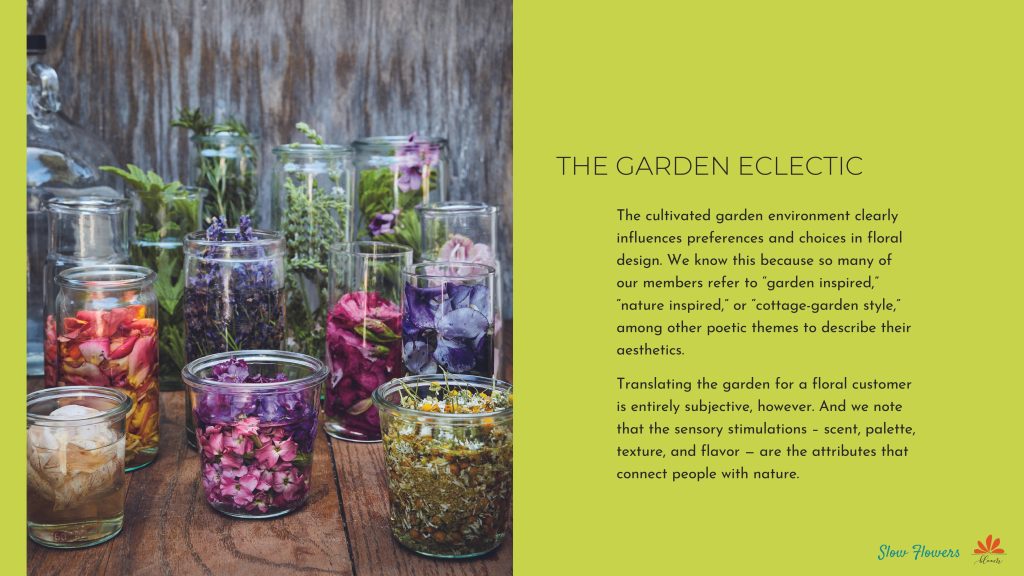
THE GARDEN ECLECTIC: The cultivated garden environment clearly influences preferences and choices in floral design. Translating the garden for a floral customer is entirely subjective. While sensory stimulations – scent, palette, texture, and flavor — are the attributes that connect people with nature. When it comes to color, florists and their customers have long been moving beyond beige and blush (noted in the first Slow Flowers Floral Insights & Industry Forecast in 2015) and when it comes to scent, there is a move away from hybridized, unscented flowers, to the perfume a garden offers.
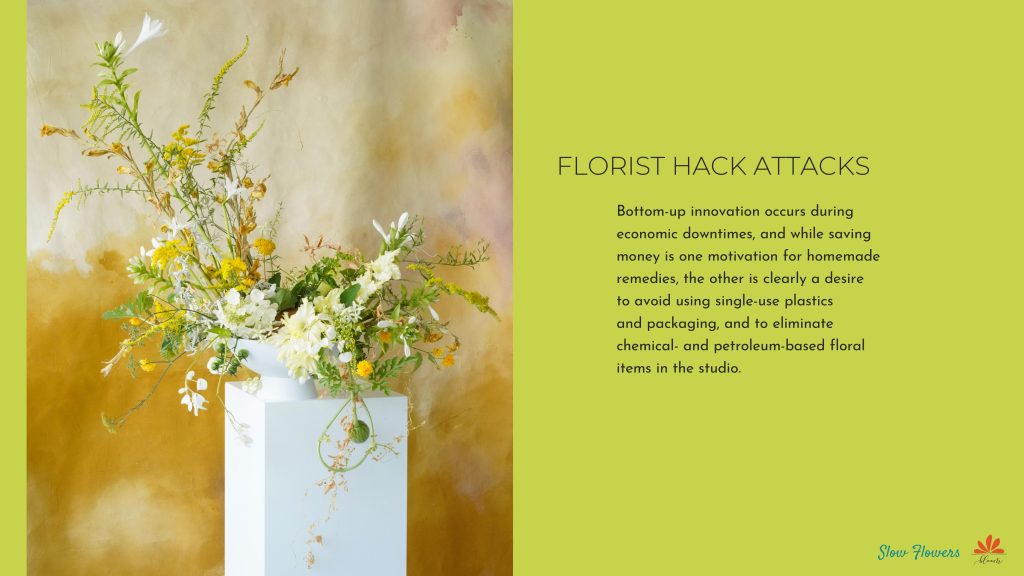
FLORIST HACK ATTACKS: Bottom-up innovation occurs during economic downtimes, and while saving money is one motivation for homemade remedies, the other is clearly a desire to avoid using single-use plastics and packaging, and to eliminate chemical- and petroleum-based floral items in the studio. This momentum began with the groundswell of #foamfree sentiments and The use of plant-based dyes to transform ribbons and table linens. There seems to be no limit to florists wanting to formulate non-toxic materials to achieve design solutions.
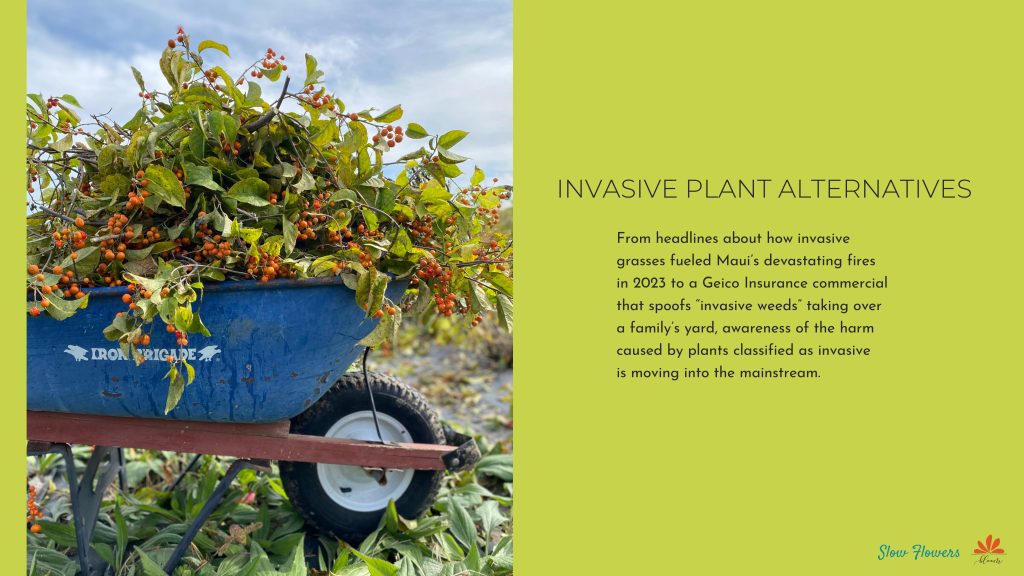
INVASIVE PLANT ALTERNATIVES: As native plants and their benefits move to the foreground, the problems surrounding aggressive or invasive plants is undeniable. From headlines about how invasive grasses fueled Maui’s devastating fires in 2023 to a Geico Insurance commercial that spoofs “invasive weeds” taking over a family’s yard, awareness of the harm caused by plants classified as invasive is moving into the mainstream.
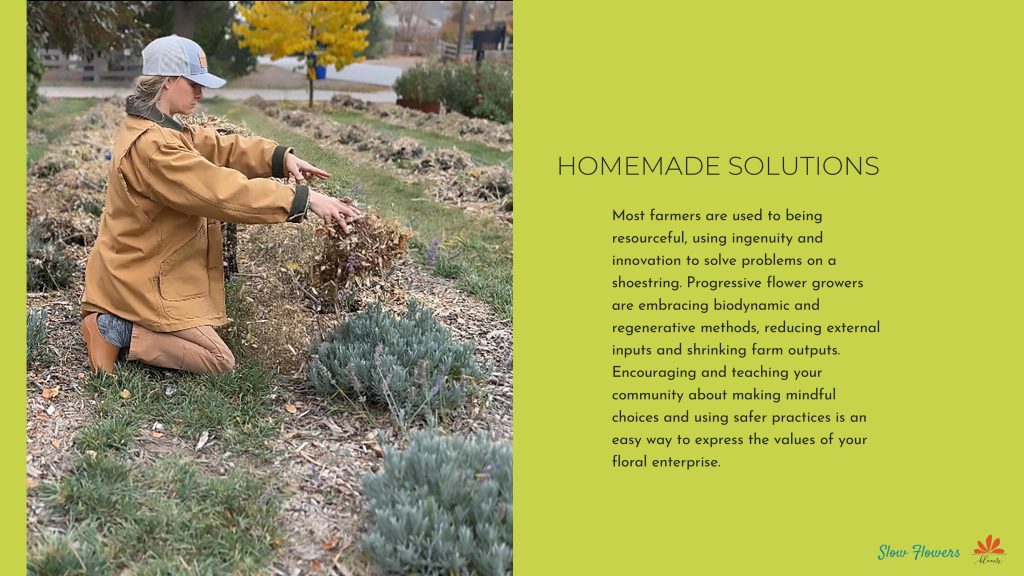
HOMEMADE SOLUTIONS: Most farmers are used to being resourceful, using ingenuity and innovation to solve problems on a shoestring. Progressive flower growers are embracing biodynamic and regenerative methods, reducing external inputs and shrinking farm outputs. Whether the motivation is budget savings or reducing reliance on conventional agricultural practices, we note that a gradual, simpler, more sustainable and circular approach to farming is under way. From traditional compost and fertilizer recipes to amendments that utilize natural ingredients, homemade solutions are moving to the forefront rather than bagged products and other off-the-shelf options.
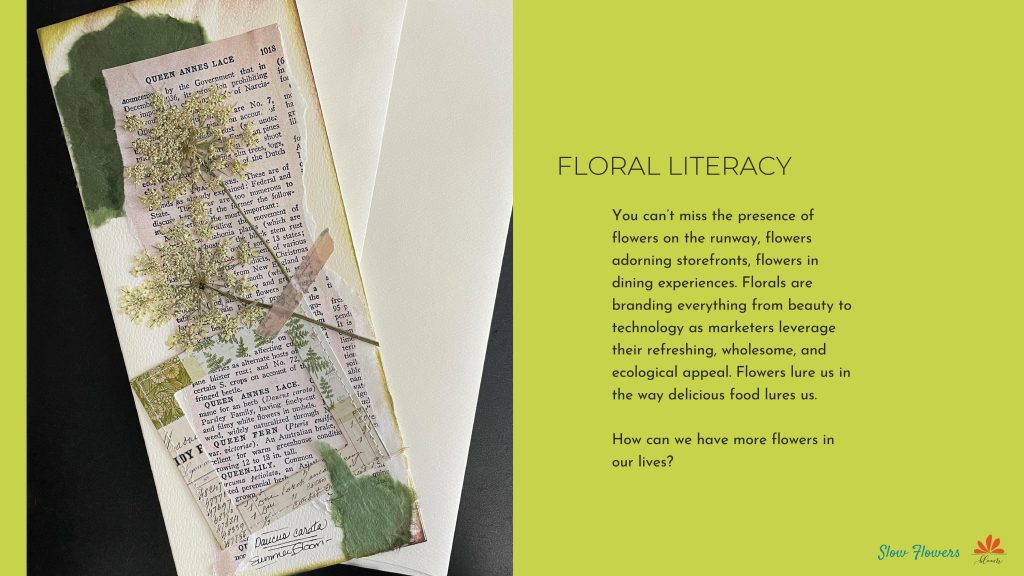
FLORAL LITERACY: Madison Avenue’s favorite advertising icon? Flowers! Flowers on the runway, flowers adorning storefronts, flowers in dining experiences. Florals are branding everything from beauty to technology as marketers leverage their refreshing, wholesome, and ecological appeal. Flowers lure us in the way delicious food lures us. How can we have more flowers in our lives? Explore the many ways that florists and growers are helping their customers connect more deeply with nature through floral experiences.
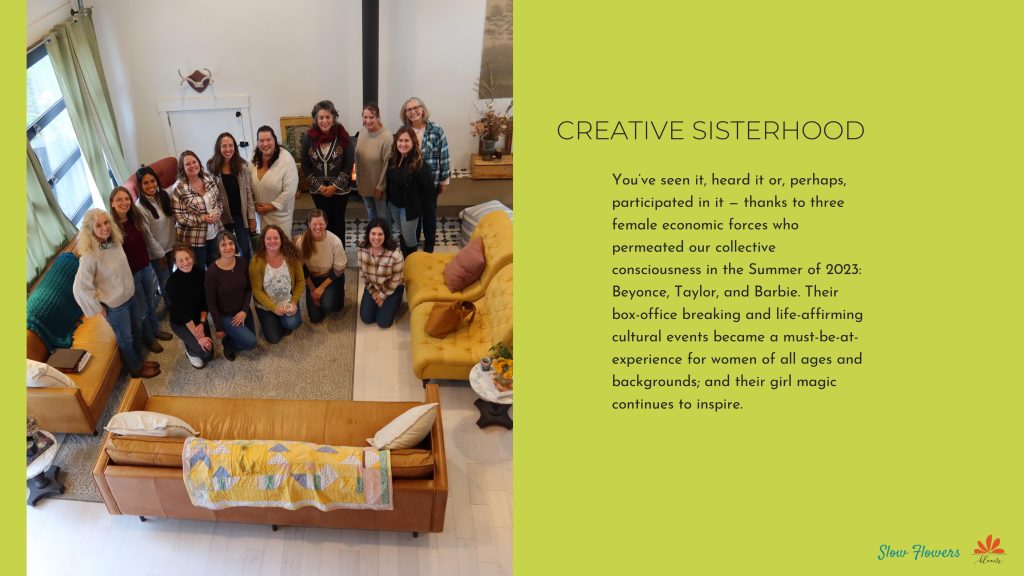
CREATIVE SISTERHOOD: You’ve seen it, heard it or, perhaps, participated in it — thanks goes to the three female economic forces who permeated our collective consciousness in the Summer of 2023: Beyonce, Taylor, and Barbie. Their box-office breaking and life-affirming cultural events became a must-be-at-experience for women of all ages and backgrounds; and their girl magic continues to inspire. As the boundaries break down, all kinds of new friendships are being made. Sisterhoods are truly empowering and the reality that women together can change the conversation of our time is inspiring. We all want to be part of it.
In conjunction with their audio and video presentations (available at slowflowerspodcast.com), the authors published a 38-page digital report, illustrated with images from Slow Flowers Society members.
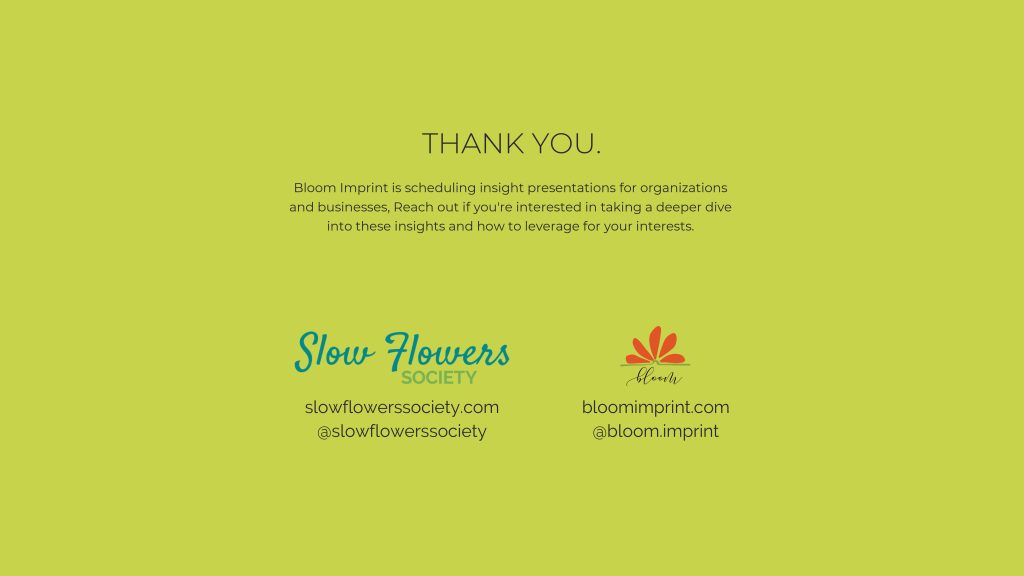
BLOOM Imprint is scheduling insight presentations for organizations and businesses, so reach out if you’re interested in taking a deeper dive into what these concepts mean for you and how to leverage our intelligence.
